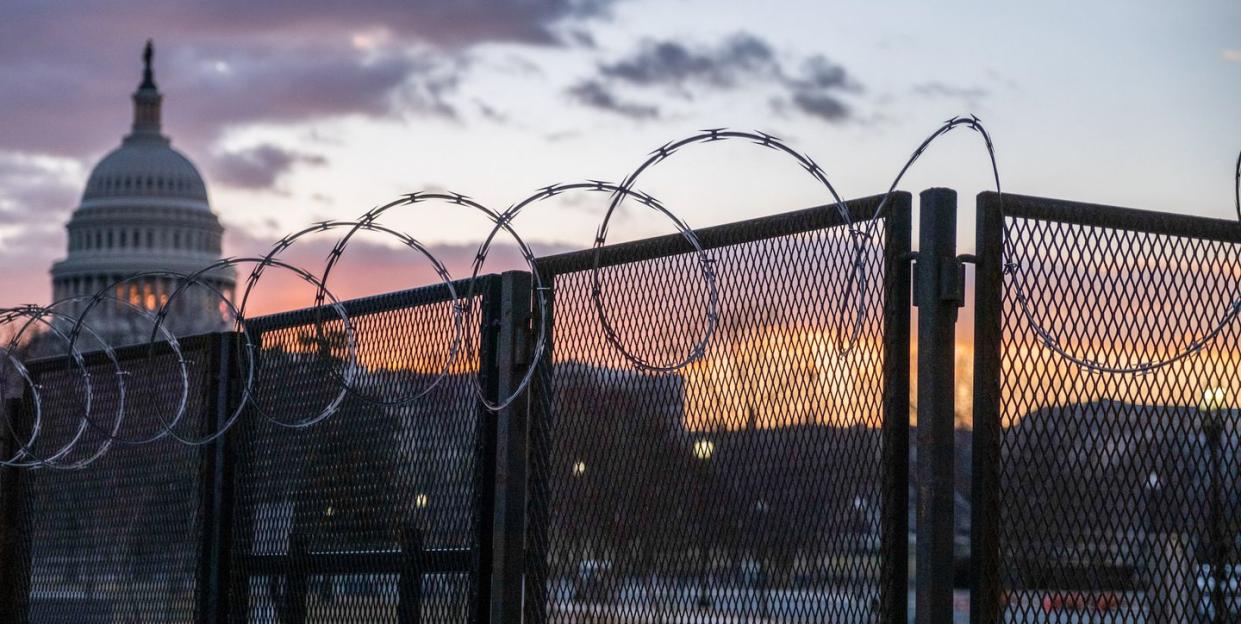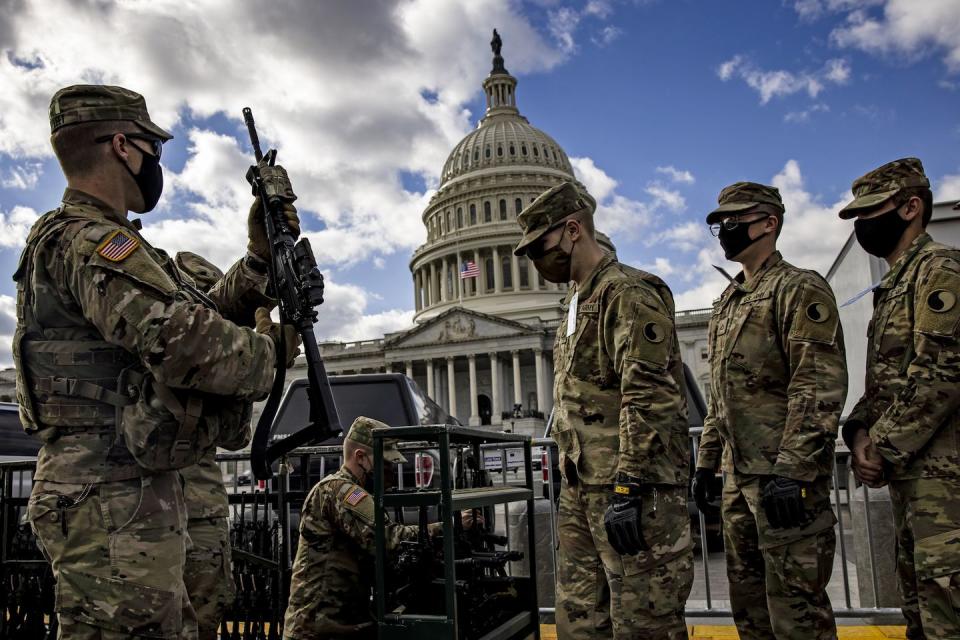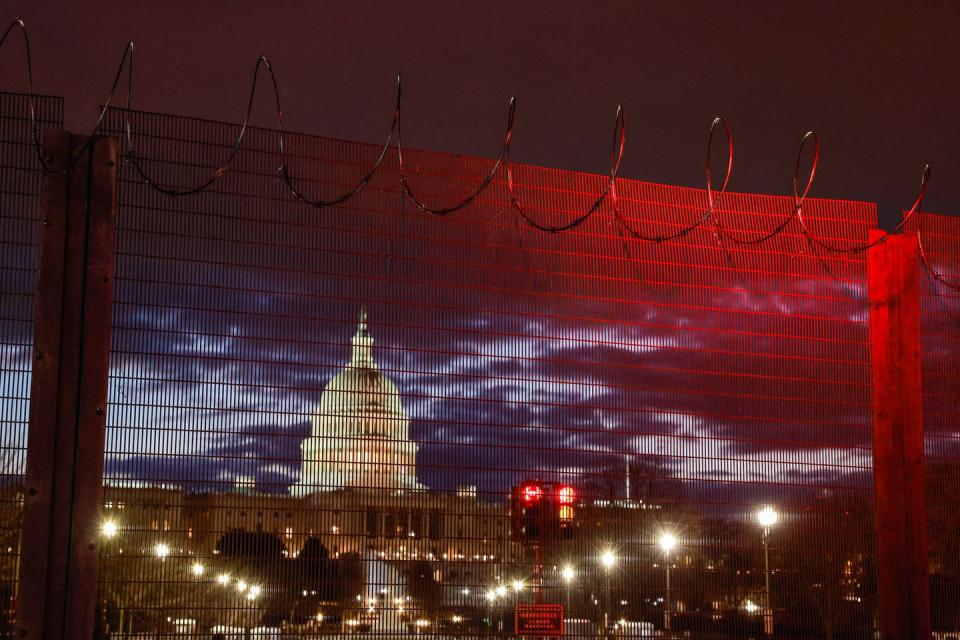If We Don't Pass This Bill, 'We Are F*cked as a Nation'

1-6-2021 is not a collection of numbers that evokes visions of an American democratic republic in vibrant good health. A violent insurrection will do that. But we should also have a look at another number: $14 billion. That's the pile of cash that the Center for Responsive Politics estimates was spent trying to influence the 2020 elections. That's more than twice as much as was spent in 2016. Billions of it took the form of so-called "dark money," where donors route their money through organizations designated as "non-profits," which don't have to disclose their donors. It's a deluge of dollars, much of it opaque and difficult to trace, spent to put people in positions of power. Nobody spends this kind of money without looking for something in return. It's a corrosive element eating away at the foundations of the American project, and it's not the only one.
"It's all seamlessly connected in the public's mind," says Congressman John Sarbanes, who's represented Maryland's 3rd congressional district since 2007. He says that through those years, his constituents have told him some version of the same few things, over and over: "We want to be able to vote for you, when you get there we want you to keep paying attention to us, and don't get tangled up in the money." He added: "That should not be a tall order for somebody who wants to represent Americans in our democracy. At heart, you distill it all down, that's what we're trying to achieve with this bill."
The bill is H.R. 1, the For the People Act, which Sarbanes has sponsored for the second consecutive Congress. In the 116th Congress, which followed on the 2018 midterms—price tag $5.7 billion—the bill passed the House with sweeping Democratic support, even as the Democratic Party got into big money, including the dark variety, in a big way. The bill promptly died 'neath the scythe of "Grim Reaper" Mitch McConnell in the Senate. But Chuck Schumer is (just barely) calling the shots in the upper chamber now, and Democrats have introduced S. 1, an almost identical companion to H.R. 1. The numbers here will, perhaps, prove a good omen: that they received the #1 designation suggest their core concern for the integrity of American democracy itself—and hopefully, the urgency with which Democratic leadership will see them considered on the floor. The situation is, after all, quite urgent.

"If we don't see sweeping reforms that are contained in this bill passed, we are fucked as a nation," says Josh Silver of Represent.Us, a nonpartisan nonprofit dedicated to ending political corruption, extremism, and gridlock. Since 2012, the organization has promoted a piece of model legislation, the American Anti-Corruption Act, that is similar to H.R. 1. "Like, we will continue our decline into authoritarianism," he added. "It is these problems that the bill addresses that are the root cause of the extremism and polarization that gave rise to Trump and the new sort of anti-representative form of government that the Republican Party has chosen to embrace. And I'm saying that as a truly nonpartisan guy." Luckily, the bill enjoys broad support among the general public: 67 percent, according to one survey, including 56 percent of Republicans.
The first pillar of the legislation is clean and fair elections. "Title one of H.R. 1 is John Lewis's Voter Empowerment Act," Sarbanes says, which "he introduced for five congresses in a row to try to make voting easier, and access to the ballot box easier and more convenient for people." The bill would create automatic voter registration across the country, expand early and absentee voting, restore voting rights for felons, streamline the vote-by-mail process, and more. It prohibits various voter-suppression tactics currently in vogue, like the voter purges we've seen in Ohio and Georgia, and enhances election security through promoting the use of paper ballots and strengthening oversight of election-system vendors. The bill does not make Election Day a holiday, which Sarbanes considers unnecessary if there are a full 15 days of early voting. It backs a separate push to grant statehood to Washington, D.C., though it does not do so directly.
The bill also takes on the partisan gerrymandering that is driving so much extremism in our politics. As it stands, the vast majority of House races are not competitive because the parties draw districts in a way that ensures they will be safely Republican or Democratic. (They "pack" voters of one stripe into a single district, or "crack" them across a bunch of districts to dilute their representation.) Politicians get to pick their own voters, rather than the other way around, and in the process they create an environment where only primary elections are competitive. That in turn leads to a situation where the only mistake you can make in a red district is to be insufficiently conservative, which incentivizes extremism and disincentivizes cooperation (and sanity). Instead of party leaders in state legislatures drawing the districts to benefit themselves and their co-partisans, states would use independent commissions policed by strong conflict-of-interest rules. District maps would be approved differently, and would be more easily challenged on the basis they are partisan and unrepresentative.
The next pillar is taking on dark money with the DISCLOSE Act. The bill would institute an "Honest Ads" policy, where disclosure requirements for online political advertisements are expanded and strengthened. It would put in place a "Right to Know" policy where corporations would have to make shareholders aware of their specific political activity. It would root out participation of foreign nationals in fundraising—a foreign money ban. It would, per the name, beef up disclosure requirements for organizations engaging in political spending, including by reinforcing the Internal Revenue Service's powers and prerogative to investigate misuse of charities to hide the source of political money.

As it stands, donors can use a loophole to route their money through 501(c)3-designated "charitable" organizations, which don't have to disclose their donors, which can then give the money to SuperPACs to blanket the airwaves with political messaging designed to sway elections. When the IRS sought to police this a few years back, Republicans raised an unholy stink on the basis it constituted "bias" against conservatives, whose biggest donors often abuse this mechanism. In reality, the IRS had been investigating liberal nonprofits as well, but Republicans have been successful in scaring off this kind of enforcement since. The IRS should resume enforcement against both parties' dark-money apparatuses—after all, the Democrats have started raking it in, too.
The bill also deals with inauguration fundraising, a perennial hotbed for sketchy dealings. That went for Donald Trump, whose setup was investigated by federal prosecutors, and Joe Biden, who took huge money for his inauguration despite it being virtual. (It did, in the end, look fairly expensive, but still.) The questions are always who is paying, and what they expect in return. Biden made more efforts at transparency than Trump, but donations were still capped at $1 million for corporations and $500,000 for individuals. H.R. 1 would cap them at $50,000. In general, the legislation is a major step towards combatting the big money machine by reclaiming the Legislative Branch's power to regulate elections, severely diminished through inaction and the Supreme Court's disgraceful ruling in Citizens United v. FEC. Congress must reassert itself across the board (beyond just these issues) after decades of encroachment by the Executive and Judicial branches.
Get unlimited access to all of Esquire’s political coverage.
Join Esquire Select
And finally, the bill deals with lobbying. "If you're going to be in Washington and you're going to be paid to lobby people," Sarbanes says, "we want to make sure you've got to raise your hand and be accountable for what you're doing." The bill closes what he calls "the Michael Cohen exception," where people who don't lobby directly, but stand in the shadows directing others—"shadow lobbying"—aren't covered by some of the registration requirements. The bill seeks to give real teeth to the Office of Government Ethics, which will have more enforcement authority when dealing with the Executive Branch. This would have been very useful indeed under the previous regime. The bill bolsters ethics law in general: it mandates presidents release their tax returns, expands conflict-of-interest policy and divestment requirements, attempts to slow the "revolving door" by which members of Congress and their staff flit between government and the private sector, peddling their insider connections, and prevents those members from serving on corporate boards. The goal is to break the influence economy in Washington. This would require members of Congress to set aside their personal financial interests for the good of the country. You in the back—please stop laughing.
In all, the legislation deals with many of the most corrosive aspects of our system, which as it stands have essentially put government up for sale. In 2014, it inspired Represent.Us to craft a fake congressional candidate, Gil Fulbright, who starred in "honest political ads," and who started wearing logo patches for all his corporate sponsors like a NASCAR driver. "Listening to my constituents, legislating—these are things I don't do," Gil would say. "What I do is spend about 70 percent of my time raising funds for reelection." But H.R. 1 presents some hope. "I was pleasantly surprised to tell you the truth," says Silver of Represent.Us. "I did not think it was going to be this comprehensive." The bill doesn't go so far as to mandate publicly funded elections, a notion that puts off conservatives, but it does build a more robust system of voluntary public financing. It takes on the corruption of the money power in a real way.
It may prove a different kind of challenge getting it through a Congress boasting thin Democratic majorities in both chambers. A highly similar bill passed handily in the House last cycle, but that was symbolic—it was never going to become law, because McConnell was never going to take it up in the Senate. Now they're playing with live ammunition. "Now that it's not symbolic," Silver said, "those legislators who are more in bed with special interests and broken establishments are starting to bark, and we have to light a fire under them." It's a group that includes Democrats: "The problem is that government capture by big-money special interests is not unique to the Republicans, right? The Democrats have been captured by big-money special interests for generations, really since the 1970s, when corporate America began building its lobbying filings in Washington, DC in the wake of, oddly, Nixon and the creation of OSHA and EPA."
Are enough Democrats interested in good government—or willing to defy the special interests whispering in their ears—to get this thing through? It will take sustained pressure, which should probably extend to Republican moderates like Lisa Murkowski, who might be useful for passage in the Senate. "It's possible that, for the first time since Watergate, the Democrats finally understand that updating archaic and broken election and campaign finance and ethics laws is central to the survival of representative democracy and the American experiment itself," Silver said. "Frankly, Bill Clinton running for office gave lots of lip service to these kinds of reforms and sat on his hands. Barack Obama gave lip service to these kinds of reforms and sat on his hands. And we expected the same this session, but that all changed when Senator Schumer offered the companion piece to H.R.1 as their first piece of legislation." Time to go to work, then.
Editor's Note: The bill seeks to build a more robust system of voluntary public financing. This story has been updated to reflect that.
You Might Also Like

